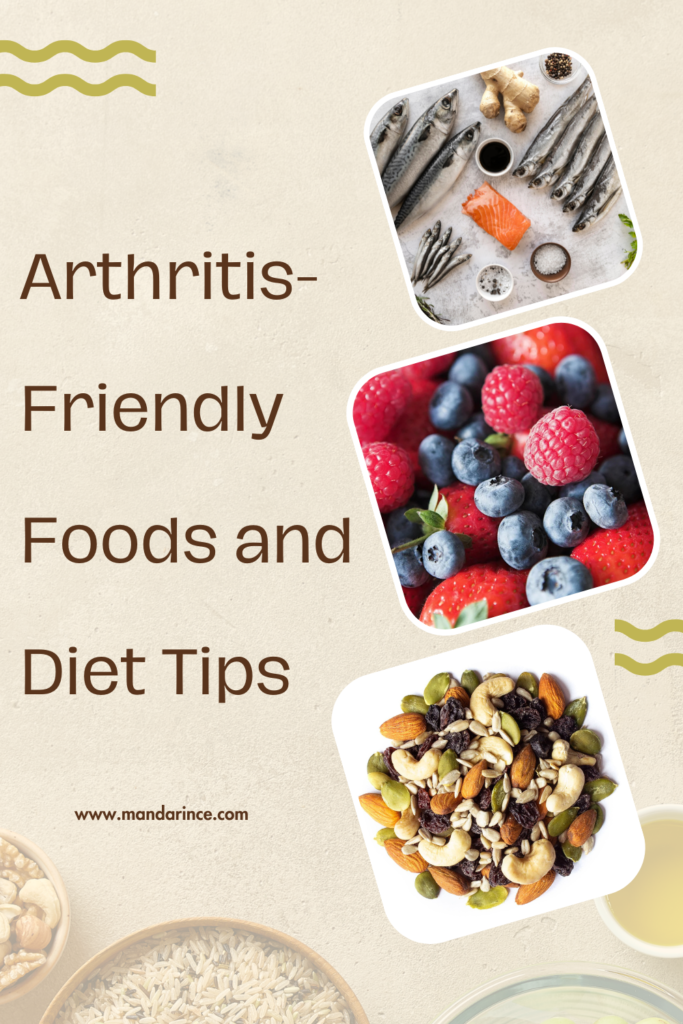Arthritis is a chronic condition that affects millions of people, causing joint pain, inflammation, and reduced mobility. While there is no cure, research suggests that dietary choices can play a significant role in managing symptoms. Certain foods may help reduce inflammation, while others can trigger joint pain and worsen discomfort. By following an arthritis-friendly diet, individuals may experience relief from symptoms, improved joint function, and overall better well-being.

What Is an Arthritis Diet?
An arthritis diet is an eating plan designed to support joint health, reduce inflammation, and improve mobility. It emphasizes anti-inflammatory foods rich in nutrients that help strengthen bones, protect cartilage, and minimize oxidative stress. It also limits foods that may trigger inflammation, contributing to joint stiffness and pain.
While diet alone cannot cure arthritis, it can be an effective complementary strategy to medical treatments. Studies suggest that certain dietary patterns, such as the Mediterranean diet and anti-inflammatory diets, may help manage symptoms and improve quality of life.
Benefits of an Arthritis Diet
1. May Reduce Inflammation
Inflammation is a key factor in arthritis-related joint pain. Certain foods, such as walnuts, ginger, and garlic, contain anti-inflammatory properties that may help reduce swelling and discomfort.
2. May Help Relieve Pain
A well-balanced diet filled with anti-inflammatory foods may help ease arthritis-related pain. One study found that people with rheumatoid arthritis who consumed blueberries and spinach reported improvements in pain and stiffness.
3. Supports Joint Health
Nutrient-rich foods like berries, walnuts, and leafy greens contain antioxidants that protect joint tissues and may help slow down arthritis progression.
4. Helps with Weight Management
Maintaining a healthy weight reduces joint strain and inflammation. An arthritis-friendly diet, rich in whole foods and low in processed sugars and unhealthy fats, may support weight loss and pain reduction.
5. Enhances Quality of Life
By reducing pain and improving mobility, an arthritis diet helps individuals stay active and engage in daily activities more comfortably.
How Does an Arthritis Diet Work?
- Focusing on anti-inflammatory foods – Includes omega-3 fatty acids, antioxidants, and fiber-rich foods to fight inflammation.
- Eliminating inflammatory triggers – Avoids processed foods, excess sugar, and unhealthy fats that may worsen symptoms.
- Balancing essential nutrients – Provides vitamins, minerals, and healthy fats needed for optimal joint function.
Foods to Avoid
Certain foods may trigger inflammation, weight gain, and joint pain. Here’s what to limit or avoid:
- Processed Foods – Packaged snacks, fast food, and refined carbohydrates contain trans fats that contribute to inflammation.
- Sugary Drinks – Sodas and sugary beverages may lead to weight gain, adding stress to joints.
- Red & Processed Meats – High in saturated fats, which may increase inflammation and worsen the symptoms.
- Refined Grains – White bread, cakes, and biscuits have a high glycemic index, potentially increasing inflammation.
- Alcohol – Excessive alcohol consumption may negatively affect joints and worsen the symptoms.
- High-Sodium Foods – Salty processed foods can contribute to joint swelling and discomfort.
Best Foods for Relief
Incorporating nutrient-rich, anti-inflammatory foods may help manage the symptoms. Here are the best options:
- Fatty Fish – Salmon, sardines, and mackerel are rich in omega-3 fatty acids, known for their anti-inflammatory properties.
- Berries – Blueberries, strawberries, and raspberries contain antioxidants that help reduce joint inflammation.
- Leafy Greens – Spinach, kale, and broccoli provide fiber, vitamins, and minerals to support joint health.
- Nuts & Seeds – Walnuts, flaxseeds, and chia seeds are high in omega-3s and fiber, helping ease symptoms.
- Olive Oil – Extra virgin olive oil contains healthy fats and antioxidants that support anti-inflammatory responses.
- Whole Grains – Brown rice, quinoa, and oats are fiber-rich and may help lower inflammation.
- Beans & Legumes – Lentils, chickpeas, and black beans provide protein, antioxidants, and fiber for arthritis management.
- Spices (Turmeric & Ginger) – These natural anti-inflammatories may help reduce arthritis pain and stiffness.
The Mediterranean Diet & Arthritis
The Mediterranean diet is widely recognized for its anti-inflammatory benefits, making it an excellent choice for arthritis management. This diet includes:
- Fresh fruits & vegetables
- Whole grains & legumes
- Healthy fats like olive oil
- Lean proteins such as fish & poultry
Research suggests that following a Mediterranean diet may help reduce inflammation and improve joint mobility in people with arthritis.
Should You Take Supplements?
While a balanced diet provides most essential nutrients, some people may benefit from supplements, including:
- Omega-3 Fatty Acids (Fish Oil) – May reduce joint stiffness and inflammation.
- Vitamin D & Calcium – Support bone health and prevent joint deterioration.
- Glucosamine & Chondroitin – May aid in cartilage protection and joint mobility.
- Collagen Supplements – Support joint flexibility and strength.
Always consult a doctor before taking supplements to ensure they fit your health needs.
Additional Tips for Managing Arthritis Through Diet
- Maintain a healthy weight – Reduces stress on joints, minimizing pain.
- Stay hydrated – Drinking enough water supports joint lubrication and mobility.
- Keep a food journal – Helps track symptoms and identify trigger foods.
- Manage stress – Chronic stress can worsen inflammation; try yoga, meditation, or breathing exercises.
- Consult a dietitian – Get personalized dietary recommendations for arthritis management.
Adopting an arthritis-friendly diet can play a crucial role in reducing inflammation, managing joint pain, and improving overall quality of life. While no single diet can cure arthritis, the right food choices can complement medical treatments and enhance daily well-being. For best results, work with a healthcare provider or dietitian to tailor a diet that suits your specific needs.
